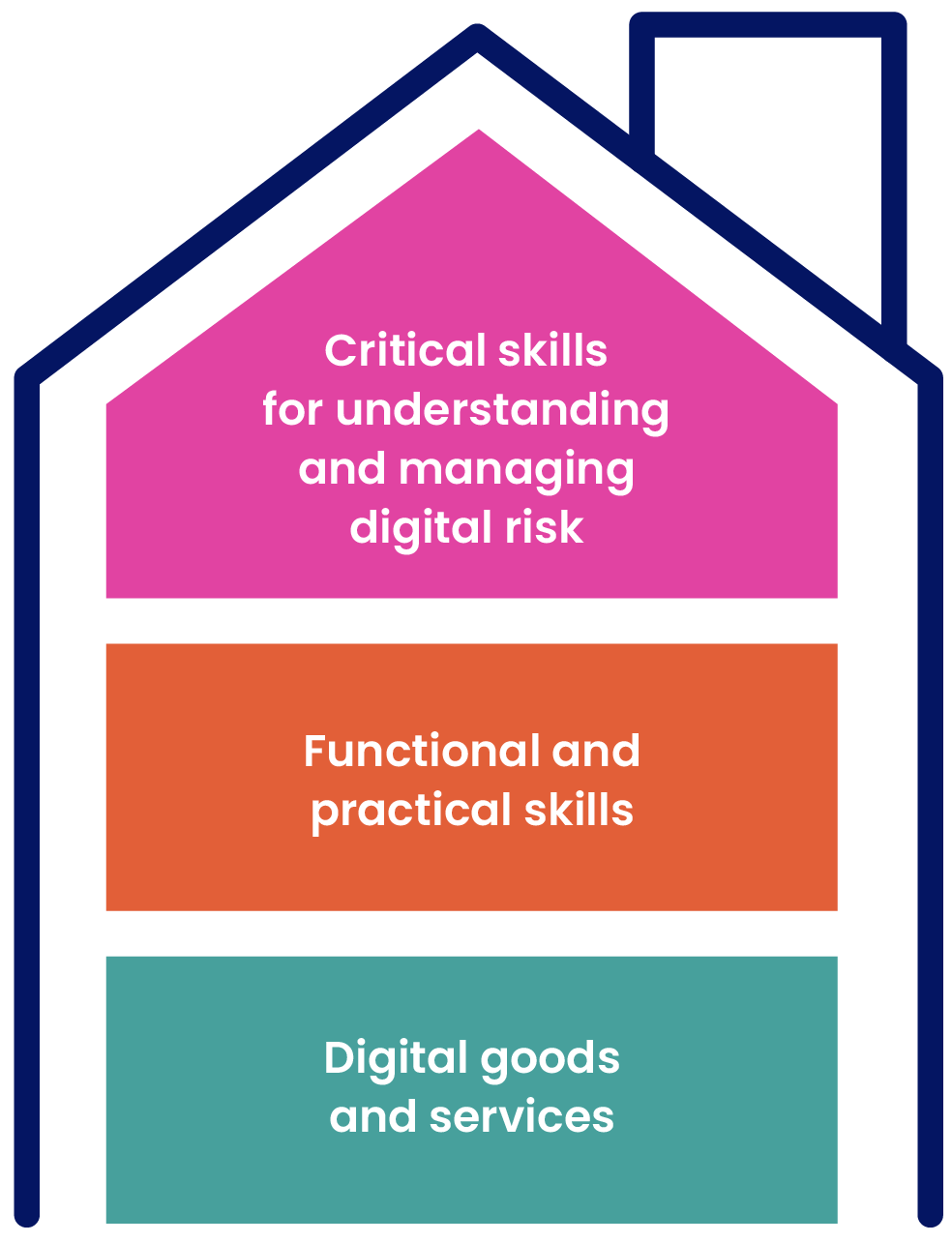Research process
A new form of research
The MDLS advances research and policy discussions beyond simplistic individualised measures of access or skills. It adopts a new bottom-up, citizen- and household-focused approach to understanding digital inclusion, exclusion, and inequalities. By utilising the MIS methodology to develop MDLS, we drew directly on the lived experiences of citizens while situating the measure at the household level. This helped us to:
- Understand digital exclusion as a result of various factors (access to goods, services, skills, and knowledge) that restrict citizens’ and households’ digital opportunities and participation.
- Consider digital inequalities as complex, relative to time and social context, and intricately connected to other forms of social inequality.
- Understand which digital inclusion policies and interventions best address the factors and contexts that limit citizens’ and households’ digital capabilities.

The current UK Digital Inclusion Action Plan, along with the digital inclusion strategies of the Welsh and Scottish governments and those of local and regional authorities, either directly utilises MDLS or adopts a more holistic approach that extends beyond basic access and skills. As we outline the significance of MDLS in bridging digital divides, it is essential to acknowledge its alignment with the broader Sustainable Development Goals (SDGs). The pursuit of MDLS not only advances digital inclusion within the UK but also resonates with global commitments to reduce inequalities (SDG 10), ensure quality education (SDG 4), and promote inclusive societies for sustainable development (SDG 16). This report highlights how MDLS serves as a critical mechanism in achieving these goals, underpinning the necessity for integrated strategies that address digital inclusivity as part of the UK’s commitment to the SDGs.
Phase 1: Households with children 2022-2024
Click below to expand each stage in our research process.
Stage 1
The first stage of research (orientation) was to develop a shared definition. This comprised four focus groups with members of the public during February and March 2022 in England, Scotland and Wales. These groups included: people of working-age and pension age, and households with and without dependent children. The definition comprised is as follows:
‘A minimum digital standard of living includes, but is more than, having accessible internet, adequate equipment, and the skills, knowledge and support people need. It is about being able to communicate, connect and engage with opportunities safely and with confidence.’
The orientation groups generated rich discussions around living in a digital world, the benefits and drawbacks, and the implications of being digitally included or excluded. Key themes were:
- Needing to participate in a digital world was seen as inevitable
- Importance of digital inclusion across all aspects of life, with Covid accelerating this
- Benefits include social connection, convenience, instant access to information, choices, expanded horizons, navigation, safety, saving money, entertainment, and sustainability.
- Harms included scams, misinformation, impulse buying, effects on family life, mental health, costs of tech, feeling forced to go online, and loss of human contact in services.
Discussions also explored how parental exclusion can lead to children’s exclusion, for example, stigma among peers and missing out socially as well as educationally. People talked about different types of support to meet various needs, with older individuals particularly emphasising in-person support. Across all the groups, a variety of experiences and multifaceted attitudes emerged, which rarely resulted in a binary divide of included or excluded.
Stage 2
Three iterative stages of deliberative groups with members of the public are underway: task groups, checkback groups, and final groups. Groups discuss in detail what they feel families with children need to meet the definition. At each stage, groups are freshly recruited to test and broaden public consensus, which will lead to consensus on the detailed standard.
Stage 3
In-depth group consultations will explore the relevance of the standard with regard to key dimensions of lived experience and intersectionality, such as disability, ethnicity, rurality, and poverty.
With funding from Nominet, additional groups with young people will ensure young people’s perspectives on a minimum acceptable digital life are included in setting a standard for UK urban households with children. Insights will contribute to Nominet’s benchmarking research on young people’s digital experiences – the Nominet Digital Youth Index.
Stage 4
The standard will then be used to develop survey measures. These will go through three iterations of expert, stakeholder and citizen testing before conducting 1500 in-person interviews, using face to face recruitment to ensure access to citizens without internet access.
Stage 5
The survey data will then be analysed with geodemographic data to produce a mapbook with estimated rates for the number of households that meet the standard.

Phase 2: Welsh MDLS 2022-2024
The current UK Digital Inclusion Action Plan, along with the digital inclusion strategies of the Welsh and Scottish governments and those of local and regional authorities, either directly utilises MDLS or adopts a more holistic approach that extends beyond basic access and skills. As we outline the significance of MDLS in bridging digital divides, it is essential to acknowledge its alignment with the broader Sustainable Development Goals (SDGs). The pursuit of MDLS not only advances digital inclusion within the UK but also resonates with global commitments to reduce inequalities (SDG 10), ensure quality education (SDG 4), and promote inclusive societies for sustainable development (SDG 16). This report highlights how MDLS serves as a critical mechanism in achieving these goals, underpinning the necessity for integrated strategies that address digital inclusivity as part of the UK’s commitment to the SDGs.
Click below to expand each stage in our research process.

Stage 1: Stakeholder interviews
Interviews with stakeholders regarding the value of the MDLS were conducted. Representatives from key stakeholder organisations focused on digital inclusion in Wales were selected. The interviews examined their organisations’ opinions on the form and content of a Welsh MDLS. They also explored the policy and practice implications or interventions that they believed would best support the uptake of a Welsh MDLS. The interviews were semi-structured and investigated the negative impacts of failing to meet the MDLS across various facets of citizens’ well-being – social, economic, health, and cultural. We asked participants to consider the level of digital need and inclusion presented by the MDLS, its feasibility, and how to achieve it for Welsh citizens. Finally, we inquired about what would aid or impede their organisation in overcoming the barriers to delivering an agreed MDLS.
Stage 2: MDLS sense check
Establishing a Minimum Digital Living Standard for Wales (W-MDLS) involved building on the Minimum Digital Living Standard for the UK (UK MDLS), as it provided a ‘baseline’ from which to explore if and how digital needs might vary for people living in Wales. The aim of MDLS research was to establish a benchmark of what people say is needed for a socially acceptable minimum (specifically, what they need to be able to access, need to have, and need to be able to do) in order to be included in today’s digital world. To this end, the research involved setting out the range of goods, services, skills, and knowledge that individuals and households would need, as determined by members of the public. The UK MDLS was designed as a ‘proof of concept’ study. While the base MDLS definition applies across household types, when looking at what is needed to meet this standard, the UK-MDLS study focused on the needs of households with dependent age children. This was seen as a useful starting point for developing MDLS, given the significance of digital use and inclusion for children and young people, and its importance within the home and family context.
Stage 3: Stakeholder review
Results from stages 1 and 2 were fed back to stakeholders through an online survey to assess agreement with the findings.
Stage 4: Interviews with households below the MDLS
The team conducted qualitative in-depth interviews with Welsh citizens who do not meet the MDLS, to explore the experiences and the consequences of unmet digital needs and the factors that can impact the ability to reach the MDLS.

Phase 3: Scottish MDLS 2024-2025
The team replicated the Welsh project in Scotland. With funding from the Scottish Government and in partnership with SCVO and the University of Glasgow, work was conducted to assess the MDLS as a policy tool in Scotland. This falls under the Scottish Government’s Digital policy. Scotland’s Minimum Digital Living Standard outcomes will support this policy and ongoing interventions such as the Connecting Scotland programme. The Scottish MDLS project had the same broad phases as the Welsh MDLS project.

Phase 4: All household types
The MDLS extension research follows the same approach as the initial Phase 1 study outlined above. It comprised a total of twelve deliberative focus groups that took place between October 2024 and March 2025. The groups included a mix of participants across gender, single and couple households (as we were interested in household as well as individual needs), and different socio-economic circumstances, with most groups also including participants from minority ethnic backgrounds. Parents of dependent-aged children had between one and four children living at home, and all groups included a mix of parents with pre-school, primary, and secondary school-age children, which was important for discussions since the digital needs of children vary by age. Participants in the young person group were aged 13 and 14. There were many similarities in needs across age ranges, and while some aspects of digital were more relevant in the groups with older participants, there were also differences within both working-age and pension-age groups, which is perhaps unsurprising given the wide age ranges covered by each category. Discussions about how to meet digital needs could relate to life stages rather than binary categories and reflect the heterogeneity within both working-age and pension-age populations in their digital experiences and attitudes.
Similar to our initial MDLS method, these groups were conducted in three steps (task group, checkback, and final), with findings and decisions from one stage leading into the next. This process was designed to review, build on, and refine the lists of items, knowledge, and skills included in MDLS. An additional three groups were conducted online with participants living in rural areas, focusing on separate groups for working-age and pension-age households without children, as well as for parents of dependent children. The decision to hold rural groups online facilitated wide geographic coverage, as it was essential to include people living in more remote locations where it would be challenging to gather for an in-person group.

Our partners
At all stages, the research team held online and in-person stakeholder seminars to share emerging findings and inform the reporting. A Project Advisory Group has also been consulted throughout all phases of the project to discuss emerging findings.




Our funders

The Nuffield Foundation is an independent charitable trust with a mission to advance social well-being. It funds research that informs social policy, primarily in Education, Welfare, and Justice. It also funds student programmes that provide opportunities for young people to develop skills in quantitative and scientific methods. The Nuffield Foundation is the founder and co-funder of the Nuffield Council on Bioethics, the Ada Lovelace Institute and the Nuffield Family Justice Observatory. The Foundation has funded this project, but the views expressed are those of the authors and not necessarily the Foundation.

Nominet aims to create a world which is more connected, inclusive and secure. For 25 years they have been operating at the heart of the internet infrastructure as proud guardians of the .UK domain name registry. Their understanding of the Domain Name System (DNS) underpins a sophisticated cyber security capability used by governments to secure their networks. Their commercial success funds an ambitious programme to improve the lives of 1 million young people a year through technology.

Welsh Government are the devolved government for Wales, which consists of the First Minister, Welsh Ministers and the Counsel General. They are supported by civil servants who work across devolved areas that include key areas of public life such as health, education and the environment.

The Scottish Government is the devolved government for Scotland and has a range of responsibilities that include: the economy, education, health, justice, rural affairs, housing, environment, equal opportunities, consumer advocacy and advice, transport and taxation.